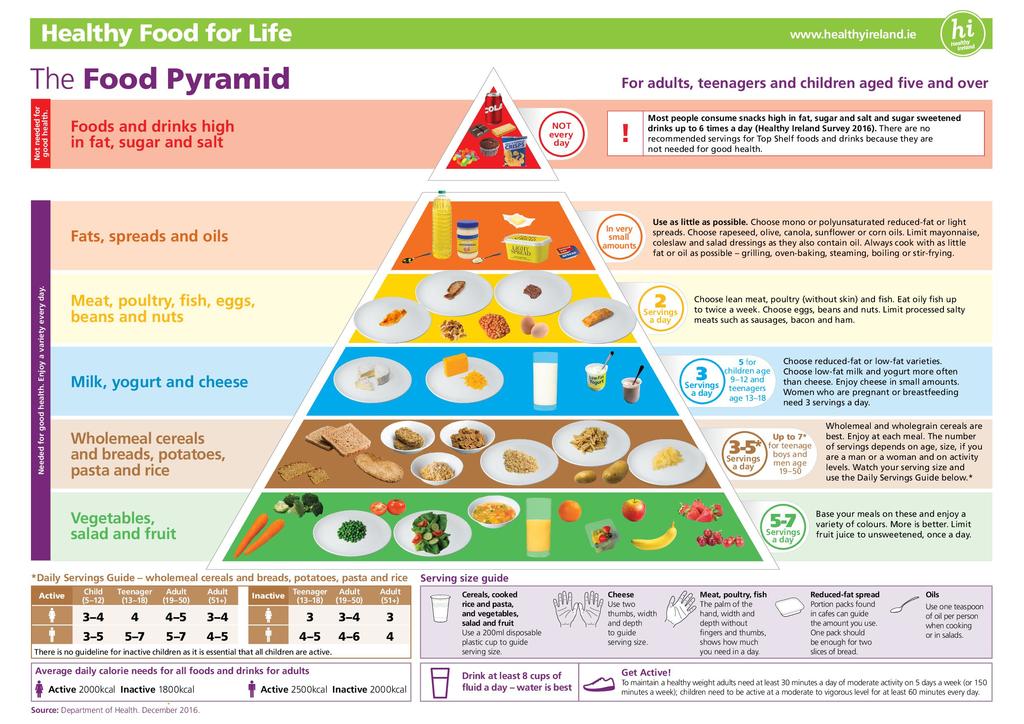The Food Pyramid is essentially a guide to a well balanced healthy diet. It is divided into 5 main shelves and details what people are recommended to eat/drink to encourage healthy eating.

The recommended serving sizes are adjusted to gender, life stage, physical size and activity levels. It is also important to note that within the Pyramid guidelines, eating a varied diet helps to ensure the adequate intake of essential nutrients.
Combine several different types of foods - from each of the main food groups - in the right amounts, so that your body gets all the nutrients it needs while maintaining a healthy weight. Studies have shown that eating more fruit and vegetables can have a protective infludence against certain cancers and systemic inflammatory (including gum) diseases.
The biggest threat to both oral and general health comes from snack foods at the top shelf of the Food Pyramid - such as cakes, biscuits, chocolate sweets and fizzy drinks which contain 'free sugars'. These foods are not required for good health. The oral health focus is limiting top shelf foods to only once or twice weekly.
Healthy Eating Guidelines and Healthy Food for Life resources (including the Food Pyramid) for the entire population over the age of 5 are available at:
Healthy Heart
Healthy eating tips for heart health and for good oral health complement one another in restricing consumption of foods/drinks containing added sugars and reducing consumption of foods high in oils and fats. The Food Pyramid, as discussed above, is a useful starting point, and is designed to enable us all to make healthier food choices. The top of the Pyramid is particularly important noting, added sugar - a direct cause of tooth decay. Food and drinks high in fat, sugar and salt, are not needed for good health, or indeed to be consumed daily. It’s a good idea to read food labels carefully for sugar content. Less than 5g per 100g is low sugar (1 teaspoon is equal to 4g of sugar).
A balanced diet including healthy snacks such as nuts, and chopped fruit in addition to an increase in fruit and vegetable consumption will lower the risk of cardiovascular disease and also of gum/periodontal disease (a risk factor for cardiovascular disease). Nutritional advice aimed at halting rising levels of obesity will also promote reduced intake of sugar-containing foods and drinks, and saturated fat in favour of a more balanced and healthy diet choices as defined by the Food Pyramid can help halt the rising levels of obesity.
For more Heart Health Eating Tips, please see Irish Heart Healthy Eating - Irish Heart
Calcium for Healthy Bones and Teeth
 Calcium is essential for the development of healthy teeth and bones. It strengthens tooth enamel, your teeth’s defense against erosion and cavities. It also plays a pivotal role in strengthening the jaw bones that hold the teeth in place. Dairy foods like milk, yogurt and cheese are great sources of calcium.
Calcium is essential for the development of healthy teeth and bones. It strengthens tooth enamel, your teeth’s defense against erosion and cavities. It also plays a pivotal role in strengthening the jaw bones that hold the teeth in place. Dairy foods like milk, yogurt and cheese are great sources of calcium.
The Department of Health's Food Pyramid recommends three servings of dairy per day for adults and children under 9 years of age. For those aged between 9 and 18 years and for women who are pregnant or breastfeeding, 5 servings are recommended.
One serving is: A glass of milk (200ml), a pot of yoghurt (125ml) - some yoghurts and yoghurt drinks can have added sugar so check the label and a matchbox sized piece of cheese.
Adults and children over 2 years of age, can choose a low-fat option, but only full fat products should be given to children under 2. Low-fat options provide the same amount of calcium and other nutrients with fewer calories and saturated fat.
Here are some ways to include more dairy in your diet: Have milk or natural yoghurt with cereal for breakfast. Add natural yoghurt to some fresh fruit. Add grated cheese to your salad or pasta. Have a glass of milk with your dinner. Add milk to your omelette or scrambled eggs.
If you are lactose intolerent, calcium can also be found in other foods, including: Almonds, tinned fish e.g. sardines or salmon, spinach, broccoli and green beans.